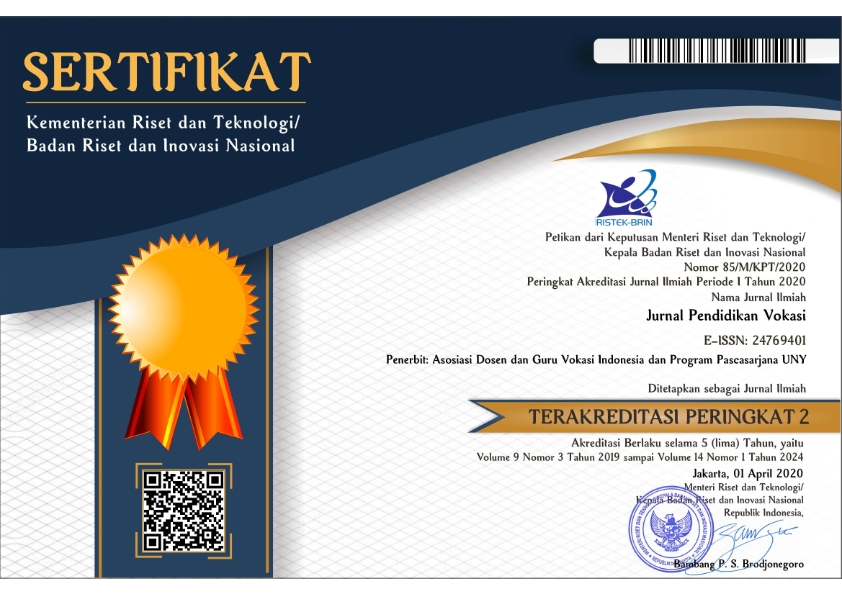The evaluation of project-based learning in Malaysia: propose a new framework for polytechnics system
DOI:
https://doi.org/10.21831/jpv.v8i2.19100Keywords:
project-based learning, polytechnics, evaluationAbstract
Technical and Vocational Education is one of the various disciplines that believed could encourage the country's economic growth. Project-Based Learning or PBL was introduced in the Malaysian polytechnics curriculum in terms to produce creative and innovative graduates Thus, Project-Based Learning was introduced because of the ineffectiveness of the traditional lecture method. This study was a kind of descriptive study intended to examine the perception of students and supervisors regarding the Project-Based Learning at one Polytechnic in Malaysia. A population of 170 would be represented by a sample size of 118 respondents and 43 supervisors to participate in the study. The result found that the significant aspect to be included in Project-Based Learning is effective supervising skills. However, from the data, some supervisors have no proficiency skills of Project-Based Learning. Based on the empirical data which derived from the present study, a new framework for Project-Based Learning is suggested for the polytechnics system.
References
Blumenfeld, P. C., Soloway, E., Marx, R. W., Krajcik, J. S., Guzdial, M., & Palincsar, A. (1991). Motivating Project-Based Learning: Sustaining the Doing, Supporting the Learning. Educational Psychologist, 26(3–4), 369–398. https://doi.org/10.1080/00461520.1991.9653139
Bradley-Levine, J., & Mosier, G. (n.d.). Literature Review on Project-Based Learning.
Buck Institute for Education. (2011). Why project-based learning?
Cassell, C., & Symon, G. (2004). Essential guide to qualitative methods in organizational research. London: SAGE Publications Ltd. https://doi.org/10.4135/9781446280119
Chambers, J. M., Carbonaro, M., & Rex, M. (2007). Scaffolding knowledge construction through robotic technology: a middle school case study. Electronic Journal for the Integration of Technology in Education, 6, 55–70.
David, J. L. (2008). What research says about/project-based learning. Educational Leadership Teaching Students to Think, 65(5), 80–82.
EL KAMOUN, N., Bousmah, M., & Aqqal, A. (2011). Virtual environment online for the project based learning session. Cyber Journals: Multidisciplinary Journals in Science and Technology, Journal of Selected Areas in Software Engineering (JSSE), 22–32.
Goodman, B. (2010). Project-based learning why use it?
Grant, M. M. (2002). Getting a grip on project-based learning: theory, cases and recommendations. Meridian A Middle School Computer Technologies Journal, 5(1), 1–17.
Guven, Y., & Duman, H. G. (2007). Project based learning for chi̇ldren with mild mental disabilities. International Journal of Special Education, 22, 77–82.
Hmelo-Silver, C. E. (2004). Problem-based learning: What and how do students learn? Educational Psychology Review, 16(3), 235–266. https://doi.org/10.1023/B:EDPR.0000034022.16470.f3
Krejcie, R. V., & Morgan, D. W. (1970). Determining sample size for research aactivities. Educational and Psychological Measurement, 30(3), 607–610. https://doi.org/10.1177/001316447003000308
Lipson, A., Epstein, A. W., Bras, R., & Hodges, K. (2007). Students' perceptions of terrascope, a project-based freshman learning community. Journal of Science Education and Technology, 16(4), 349–364.
Mergendoller, J. R., & Thomas, J. W. (2000). Managing Project Based Learning: principles from the field. Retrieved April 18, 2013, from http://www.bie.org/images/uploads/general/f6d0b4a5d9e37c0e0317acb7942d27b0.pdf
Moursund, D. (2002). ICT-assisted project-based learning. Retrieved April 18, 2013, from http://pages.uoregon.edu/moursund/PBL/index.html
Schneider, D. K. (2005). Project-based learning.
Wahab, S. H. A., Zakaria, M. A., & Jasmi, M. A. (2010). Transformational of Malaysian polytechnics into university college in 2015: issues and challenges for Malaysian technical and vocational education. In The 1st UPI International Conference on Technical and Vocational Education and Training. Bandung: Universitas Pendidikan Indonesia.
Zimmerman, D. (2012). 8 Essential characteristics of project based learning. Retrieved April 1, 2013, from http://www.behrmanhouse.com/blog/8-essential-characteristics-of-project-based-learning.htmlDownloads
Published
How to Cite
Issue
Section
License
The authors submitting a manuscript to this journal agree that, if accepted for publication, copyright publishing of the submission shall be assigned to Jurnal Pendidikan Vokasi. However, even though the journal asks for a copyright transfer, the authors retain (or are granted back) significant scholarly rights.
The copyright transfer agreement form can be downloaded here: [JPV Copyright Transfer Agreement Form]
The copyright form should be signed originally and sent to the Editorial Office through email to jpvokasi@uny.ac.id
Jurnal Pendidikan Vokasi by http://journal.uny.ac.id/index.php/jpv is licensed under a Creative Commons Attribution-ShareAlike 4.0 International License.














